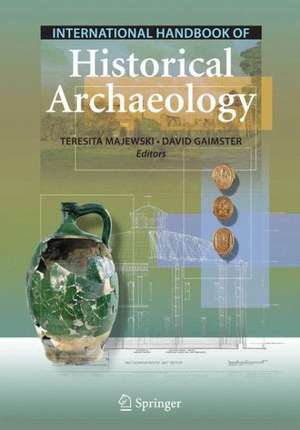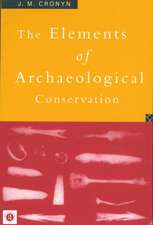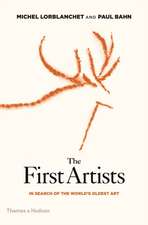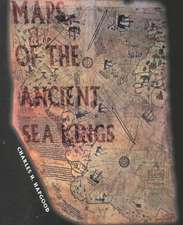International Handbook of Historical Archaeology
Editat de Teresita Majewski, David Gaimsteren Limba Engleză Hardback – 29 iun 2009
Historical archaeology is a branch of global archaeology that has grown in the last 40 years from its North American base into an increasingly global community of archaeologists each studying their area of the world in a historical context. Where historical archaeology started as part of the study of the post-Columbian societies of the United States and Canada, it has now expanded to interface with the post-medieval archaeologies of Europe and the diverse post-imperial experiences of Africa, Latin America, and Australasia.
The 36 essays in the International Handbook of Historical Archaeology have been specially commissioned from the leading researchers in their fields, creating a wide-ranging digest of the increasingly global field of historical archaeology. The volume is divided into two sections, the first reviewing the key themes, issues, and approaches of historical archaeology today, and the second containing a series of case studies charting the development and current state of historical archaeological practice around the world. This key reference work captures the energy and diversity of this global discipline today.
| Toate formatele și edițiile | Preț | Express |
|---|---|---|
| Paperback (1) | 487.73 lei 38-44 zile | |
| Springer – 3 mar 2011 | 487.73 lei 38-44 zile | |
| Hardback (1) | 632.77 lei 38-44 zile | |
| Springer – 29 iun 2009 | 632.77 lei 38-44 zile |
Preț: 632.77 lei
Preț vechi: 781.20 lei
-19% Nou
Puncte Express: 949
Preț estimativ în valută:
121.08€ • 126.74$ • 100.78£
121.08€ • 126.74$ • 100.78£
Carte tipărită la comandă
Livrare economică 27 martie-02 aprilie
Preluare comenzi: 021 569.72.76
Specificații
ISBN-13: 9780387720685
ISBN-10: 0387720685
Pagini: 698
Ilustrații: XX, 698 p. 130 illus., 1 illus. in color.
Dimensiuni: 193 x 260 x 43 mm
Greutate: 1.68 kg
Ediția:2009
Editura: Springer
Colecția Springer
Locul publicării:New York, NY, United States
ISBN-10: 0387720685
Pagini: 698
Ilustrații: XX, 698 p. 130 illus., 1 illus. in color.
Dimensiuni: 193 x 260 x 43 mm
Greutate: 1.68 kg
Ediția:2009
Editura: Springer
Colecția Springer
Locul publicării:New York, NY, United States
Public țintă
GraduateCuprins
Section 1 Themes Issues and Approaches.- A North American Perspective on Race and Class in Historical Archaeology.- Ethical Issues in Historical Archaeology.- Colonies, Colonialism, and Cultural Entanglement: The Archaeology of Postcolumbian Intercultural Relations.- Landscape Approaches in Historical Archaeology: The Archaeology of Places.- Historical Archaeology and the Environment: A North American Perspective.- An Update on Zooarchaeology and Historical Archaeology: Progress and Prospects.- Going, Going, Gone: Underwater Cultural Resources in Decline.- Preparing for an Afterlife on Earth: The Transformation of Mortuary Behavior in Nineteenth-Century North America.- Making Historical Archaeology Postcolonial.- The Current State and Future Prospects of Theory in European Post-Medieval Archaeology.- Beyond Consumption: Toward an Archaeology of Consumerism.- Artifacts and Personal Identity.- Darwinism and Historical Archaeology.- World-Systems Theory, Networks, and Modern-World Archaeology.- Wholes, Halves, and Vacant Quarters: Ethnohistory and the Historical Method.- Industrial Archaeology.- Studying the Archaeology of War: A Model Based on the Investigation of Frontier Military Sites in the American Trans-Mississippi West.- Men–Women and Children: Gender and the Structuring of Historical Archaeology.- Interpretive Historical Archaeologies.- Asian American Studies in Historical Archaeology.- Section 2 Historical Archaeology on a Global Scale.- Family Resemblances: A Brief Overview of History, Anthropology, and Historical Archaeology in the United States.- The Archaeology of La Florida.- Historical Archaeology in South America.- Historical Archaeology in Central and Northern Mesoamerica: Development and Current Status.- Historical Archaeology in Yucatan and CentralAmerica.- Archaeologies of the African Diaspora: Brazil, Cuba, and the United States.- On the Fringes of New Spain: The Northern Borderlands and the Pacific.- Exploration, Exploitation, Expansion, and Settlement: Historical Archaeology in Canada.- An Embarrassment of Riches? Post-Medieval Archaeology in Northern and Central Europe.- The Development of Post-Medieval Archaeology in Britain: A Historical Perspective.- The Practice and Substance of Historical Archaeology in Sub-Saharan Africa.- A Sea of Diversity: Historical Archaeology in the Caribbean.- French Colonial Archaeology.- Natives and Newcomers in the Antipodes: Historical Archaeology in Australia and New Zealand.- Above and Beyond Ancient Mounds: The Archaeology of the Modern Periods in the Middle East and Eastern Mediterranean.
Textul de pe ultima copertă
In studying the past, archaeologists have focused on the material remains of our predecessors. Prehistorians generally rely almost exclusively on the diverse material record for their understanding of past societies and their behavior. Those involved in studying historically documented cultures not only have extensive material remains but also contemporary texts, images, and a range of investigative methods to enable them to build a broader and more reflexive picture of how past societies, communities, and individuals operated and behaved. Increasingly, historical archaeology refers not to a particular period, place, or a method, but rather to an approach that interrogates the tensions between artifacts and texts irrespective of context. In short, historical archaeology provides direct evidence for how humans have shaped the world we live in today. The 35 essays in the International Handbook of Historical Archaeology have been specially commissioned from leading researchers in their fields, creating a wide-ranging digest of the increasingly global field of historical archaeology that will be an essential addition to any library. Authors include both senior and junior scholars and represent the major sectors where historical archaeologists are employed today—the cultural resource/heritage management industry, universities, government agencies, and museums. The volume is divided into two sections, the first reviewing the key themes, issues, and approaches of historical archaeology today, and the second containing a series of case studies charting the development and current state of historical archaeological practice around the world. The contributions to the handbook include unique topical and regional syntheses not foundin historical archaeological compendia published to date. This key reference work captures the energy and diversity of this global discipline today, and its format and content are particularly suitable for classroom use.
Caracteristici
Brings together an international group of leaders in the field of historical or post Medieval archaeology Covers the field globally as well as theoretically Perfect as a reference book and for use in graduated level courses Includes supplementary material: sn.pub/extras













